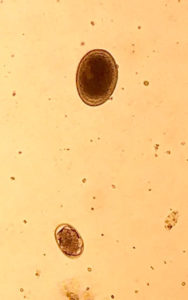Intestinal parasites (worms) are a common health problem in cats and dogs. Unlike external parasites such as fleas and ticks, intestinal parasites live inside your pet’s gastrointestinal tract. There are many types of intestinal parasites, and infection can lead to serious health complications in pets.
Common Types of Intestinal Parasites
The following are some of the most common intestinal parasites that infect cats and dogs.
- Hookworms
- Roundworms
- Tapeworms
- Whipworms
- Giardia
- Coccidia
Causes of Intestinal Parasite Infection
Pets can become infected with intestinal parasites in various different ways. One of the most common causes of infection is ingestion of parasites, eggs, or larvae. This can happen when a pet consumes contaminated food, water, feces, or soil.
Parasites can also be transmitted if a pet eats infected animals or insects. Some parasites are transmitted through insect bites, or pass from nursing mothers to their offspring.
Symptoms of Intestinal Parasite Infection
The symptoms of intestinal parasite infection can be difficult to detect since many pets are asymptomatic in the early stages of infection. If your pet displays any of the following common symptoms of intestinal parasites, please take them to your veterinarian for a checkup.
- Vomiting
- Diarrhea
- Weight loss
- Lethargy
- Swollen abdomen
- Fever
Diagnosis of Intestinal Parasite Infection
Your veterinarian will perform a physical examination to check for clinical signs of intestinal parasite infection such as bloating. A stool sample will also be taken and examined under a microscope for evidence of parasites, eggs, or larvae. In most cases, your veterinarian will be able to diagnose infection if it is present and identify the type of parasite.
Treatment of Intestinal Parasite Infection
Treatment of intestinal parasite infection will depend upon the type of parasite involved and the severity of the infection. Your veterinarian will prescribe a de-worming medication to rid your pet of parasites. Other treatments may also be necessary if your pet has developed health complications related to the infection.
It is very important to follow your veterinarian’s treatment plan and administer medications as instructed. Treatment may need to be repeated several times to completely eliminate your pet’s intestinal parasites.
Prevention of Intestinal Parasites
There are several measures you can take to minimize your pet’s risk of becoming infected with intestinal parasites.
Modern heartworm medications protect against many types of intestinal parasites and can be given monthly to protect your pet. Please ask your veterinarian for advice on choosing a safe and effective medication.
Practice good hygiene by cleaning up pet feces as soon as possible. If you own a cat, regularly clean and disinfect their litter box to prevent contamination. It’s also important to provide a source of fresh drinking water and never let your pet drink from puddles.
Finally, arrange for your veterinarian to test your pet’s stool at least once a year. If you plan to introduce a new pet to your home, make sure they are also tested to prevent the spread of infection.


